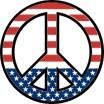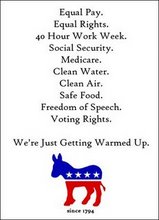Monday, April 28, 2008
Thursday, April 24, 2008
Sunday, April 20, 2008
The evilist bastard company on the block
When a product is known to cause harm (for example, Aspartame) and that knowledge is suppressed and covered up for years, when does the justice begin?
When a company is allowed to patent nature, and create an environment that is causing safe food to disappear, when does the justice begin?
Monsanto’s Harvest of Fear
When a company is allowed to patent nature, and create an environment that is causing safe food to disappear, when does the justice begin?
Monsanto’s Harvest of Fear
U R what U eat
I have managed to cut my beef and dairy consumption to near zero because of the failure of Government oversight agencies to realize that Agribusiness is not their Daddy. I have taken my food purchasing dollars to the Natural Food Stores, and am trying to stick with brands that I can feel comfortable are rejecting the overuse of chemicals and drugs to enhance production , and creating a safer dinner table environment for the world's families.
The following articles barely scratch the surface of critical issues:
Good reasons to support local farmers
Artificial hormones in U.S. beef linked to breast cancer, prostate cancer
Dr. Mom Was Right -- And Wrong -- About Washing Fruits And Vegetables
The Dangers Of Food Irradiation
The following articles barely scratch the surface of critical issues:
Good reasons to support local farmers
Artificial hormones in U.S. beef linked to breast cancer, prostate cancer
Dr. Mom Was Right -- And Wrong -- About Washing Fruits And Vegetables
The Dangers Of Food Irradiation
Friday, April 18, 2008
Well said, Catherine
Choosing a Leader
(by Catherine Crier)
As a little girl, my hero was Atticus Finch, the fictional lawyer played by Gregory Peck in To Kill a Mockingbird. Most of you know the story. The soft-spoken attorney creates a furor in his small Southern town when he accepts representation of a black man charged with raping a local white woman. For Atticus, the decision is easy. Justice requires it.
That single act changes his children's lives forever. They experience a powerful loss of innocence as the community they love and trust is split by the ensuing tensions. For the first time, Scout and her brother Jem must confront prejudice, racism and the debilitating effects of poverty on the human psyche.
They watch their father refuse to rise to the bait as tempers flare. When Atticus is spit on by the father of the 'victim', he slowly pulls out his handkerchief and wipes his face, without stepping back or breaking his intense stare at the offender. The other man is the first to back away, spewing epithets. Jem is puzzled and somewhat humiliated by his own father's apparent pacifism.
Then one day, a rabid dog comes staggering down the family's street. The housekeeper, Cal, calls frantically for Atticus to come home. Speeding to the house, the lawyer and another man, rifle in hand, exit the vehicle. When it comes time to take the shot at the rapidly approaching, obviously deranged animal, the man thrusts the gun at Atticus. Jem is wide-eyed. This must be a mistake. He watches as his bespectacled father raises the weapon and dispatches the danger with a single shot. Seeing Jim's surprise, the other man responds, "Didn't you know your Daddy is the best shot in the county?"
As the community fractures, Atticus responds calmly with candor and reason. Jem and Scout learn just how much strength their father possesses when compared to the swagger and intimidation around him. He acknowledges the dignity of others despite disagreements and insists his children do the same. "If you just learn a single trick, Scout", he tells his daughter, "you'll get along a lot better with all kinds of folks. You never really understand a person until you consider things from his point of view, until you climb inside of his skin and walk around in it." Atticus believes in inherent human goodness and in the power of America's system of laws to protect the maligned, yet there is no doubt he has the strength and will to defend his family and client if other options were foreclosed. Critically, he also believes in real justice, a concept that transcends the confines of our rules and courts.
During this contentious political season, we are called upon to judge the character of the candidates. Who should lead the nation, the fighter or the war hero? Who best wears their patriotism on their sleeve (or lapel)? Who can throw or take the biggest punch, swig the strongest shot, or bowl the highest game?
When the American Film Institute took a vote on the greatest American film hero of the last century, the winner was not Rambo, Rocky or a John Wayne cowboy. Instead it was Atticus Finch; gentle, bookish, moral, yet tough to his core. He never proclaimed his authority or postured for effect. He simply acted on his principles, with bravery and integrity, leaving no doubt who the real leader was. This might not be a bad model for the next occupant of the White House.
After watching this most recent debate, I am comforted in the fact that I no longer bother to watch any news broadcast save BBC, and I confine my television enjoyment to "Countdown". "The Daily Show", and "The Colbert Report". I also watch a fair amount of C-SPAN, but mostly get my info from news blogs and other online sources that reflect my point of view.
(by Catherine Crier)
As a little girl, my hero was Atticus Finch, the fictional lawyer played by Gregory Peck in To Kill a Mockingbird. Most of you know the story. The soft-spoken attorney creates a furor in his small Southern town when he accepts representation of a black man charged with raping a local white woman. For Atticus, the decision is easy. Justice requires it.
That single act changes his children's lives forever. They experience a powerful loss of innocence as the community they love and trust is split by the ensuing tensions. For the first time, Scout and her brother Jem must confront prejudice, racism and the debilitating effects of poverty on the human psyche.
They watch their father refuse to rise to the bait as tempers flare. When Atticus is spit on by the father of the 'victim', he slowly pulls out his handkerchief and wipes his face, without stepping back or breaking his intense stare at the offender. The other man is the first to back away, spewing epithets. Jem is puzzled and somewhat humiliated by his own father's apparent pacifism.
Then one day, a rabid dog comes staggering down the family's street. The housekeeper, Cal, calls frantically for Atticus to come home. Speeding to the house, the lawyer and another man, rifle in hand, exit the vehicle. When it comes time to take the shot at the rapidly approaching, obviously deranged animal, the man thrusts the gun at Atticus. Jem is wide-eyed. This must be a mistake. He watches as his bespectacled father raises the weapon and dispatches the danger with a single shot. Seeing Jim's surprise, the other man responds, "Didn't you know your Daddy is the best shot in the county?"
As the community fractures, Atticus responds calmly with candor and reason. Jem and Scout learn just how much strength their father possesses when compared to the swagger and intimidation around him. He acknowledges the dignity of others despite disagreements and insists his children do the same. "If you just learn a single trick, Scout", he tells his daughter, "you'll get along a lot better with all kinds of folks. You never really understand a person until you consider things from his point of view, until you climb inside of his skin and walk around in it." Atticus believes in inherent human goodness and in the power of America's system of laws to protect the maligned, yet there is no doubt he has the strength and will to defend his family and client if other options were foreclosed. Critically, he also believes in real justice, a concept that transcends the confines of our rules and courts.
During this contentious political season, we are called upon to judge the character of the candidates. Who should lead the nation, the fighter or the war hero? Who best wears their patriotism on their sleeve (or lapel)? Who can throw or take the biggest punch, swig the strongest shot, or bowl the highest game?
When the American Film Institute took a vote on the greatest American film hero of the last century, the winner was not Rambo, Rocky or a John Wayne cowboy. Instead it was Atticus Finch; gentle, bookish, moral, yet tough to his core. He never proclaimed his authority or postured for effect. He simply acted on his principles, with bravery and integrity, leaving no doubt who the real leader was. This might not be a bad model for the next occupant of the White House.
After watching this most recent debate, I am comforted in the fact that I no longer bother to watch any news broadcast save BBC, and I confine my television enjoyment to "Countdown". "The Daily Show", and "The Colbert Report". I also watch a fair amount of C-SPAN, but mostly get my info from news blogs and other online sources that reflect my point of view.
Subscribe to:
Comments (Atom)





